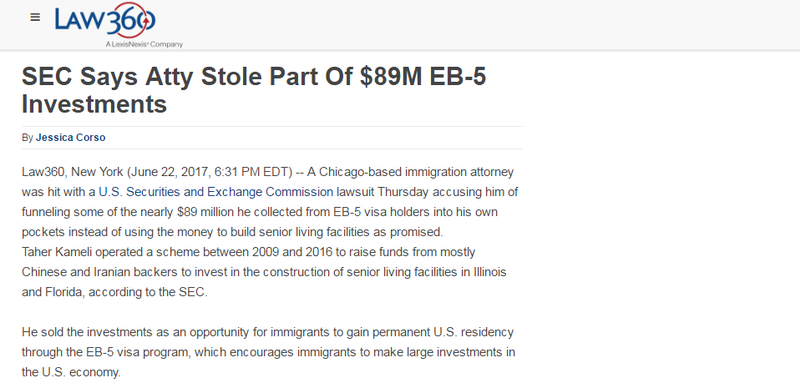SEC Says Atty Stole Part Of $89M EB-5 Investments
A Chicago-based immigration attorney was hit with a U.S. Securities and Exchange Commission lawsuit Thursday accusing him of funneling some of the nearly $89 million he collected from EB-5 visa holders into his own pockets instead of using the money to build senior living facilities as promised.
Taher Kameli operated a scheme between 2009 and 2016 to raise funds from mostly Chinese and Iranian backers to invest in the construction of senior living facilities in Illinois and Florida, according to the SEC.
He sold the investments as an opportunity for immigrants to gain permanent U.S. residency through the EB-5 visa program, which encourages immigrants to make large investments in the U.S. economy.
But he put the immigrants’ visas in jeopardy, the government says, by diverting assets from one property to another and lining his and his brother’s pockets through millions of dollars of hidden fees and unauthorized transactions.
He also used some of the money to trade securities, according to the SEC.
“Kameli’s misconduct has put investors’ contributions to the funds, and the promised investment returns on those investment amounts, at risk,” the complaint says. “Further, Kameli’s misconduct has jeopardized investors’ chances at obtaining permanent U.S. residency through the EB-5 visa program.”
The EB-5 program allows immigrants to obtain green cards by making a minimum $500,000 investment in a U.S. project that will create jobs. If, after two years, the project invested in yields 10 or more jobs for U.S. citizens, the visa holder can apply for permanent resident status, according to the government.
However, the SEC claims that poor management and fraud has put the construction of many of the proposed facilities years behind schedule.
“For example, the completion of construction of the Elgin Project has been delayed by more than five years beyond the ‘16 to 18 months’ that the Elgin Fund PPM projected in February 2010, with no date for the completion of construction within sight,” the SEC said of a facility that Kameli promised would be built in Elgin, Illinois.
The government is seeking to take immediate control of the many funds, also named as defendants, where Kameli has allegedly stored investors’ money.
“The SEC brings this action and seeks relief on an expedited basis to protect and preserve whatever assets remain in the funds and projects, to ensure an orderly process for the conduct of the funds’ and projects’ business activities, to prevent future unjust enrichment of Kameli and companies he controls, and to provide for the equitable distribution of fund and project assets,” according to the complaint.
Kameli didn’t immediately respond to a voicemail or email seeking comment Thursday.
The SEC is represented in house by Eric M. Phillips, Alyssa A. Qualls, Tracy W. Lo and BeLinda I. Mathie.
Counsel information for Kameli wasn’t immediately available Thursday.
The case is Securities Exchange Commission v. Kameli et al, case number 1:17-cv-04686, in the U.S. District Court for the Northern District of Illinois.
https://www.law360.com/illinois/articles/937626/sec-says-atty-stole-part-of-89m-eb-5-investments
Mentions
Litigation Cases
States
- New York
Videos





Subscribe for News
Site Digest
Join Professionals on EB5Projects.com →
Securities Disclaimer
This website is for informational purposes only and does not constitute an offer or solicitation to sell shares or securities. Any such offer or solicitation will be made only by means of an investment's confidential Offering Memorandum and in accordance with the terms of all applicable securities and other laws. This website does not constitute or form part of, and should not be construed as, any offer for sale or subscription of, or any invitation to offer to buy or subscribe for, any securities, nor should it or any part of it form the basis of, or be relied on in any connection with, any contract or commitment whatsoever. EB5Projects.com LLC and its affiliates expressly disclaim any and all responsibility for any direct or consequential loss or damage of any kind whatsoever arising directly or indirectly from: (i) reliance on any information contained in the website, (ii) any error, omission or inaccuracy in any such information or (iii) any action resulting therefrom.



